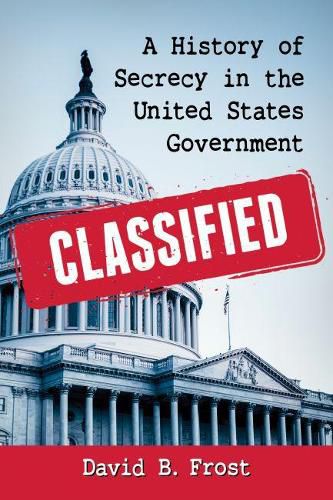Readings Newsletter
Become a Readings Member to make your shopping experience even easier.
Sign in or sign up for free!
You’re not far away from qualifying for FREE standard shipping within Australia
You’ve qualified for FREE standard shipping within Australia
The cart is loading…






This title is printed to order. This book may have been self-published. If so, we cannot guarantee the quality of the content. In the main most books will have gone through the editing process however some may not. We therefore suggest that you be aware of this before ordering this book. If in doubt check either the author or publisher’s details as we are unable to accept any returns unless they are faulty. Please contact us if you have any questions.
Secrecy historically has been seen as the act of someone who has something sinful to hide. Thomas Jefferson once counseled his young grandson that when tempted to do anything in secret, ask yourself if you would do it in public. If not, be sure it is wrong. Engaging in secrecy is not always wrong, however, either in our personal lives or in the life of our government. Secrecy has it place. Often it is necessary. When the framers of the Constitution gathered together in the summer of 1787, their deliberations were shrouded in secrecy. The doors to Pennsylvania’s State House were locked shut. Armed sentinels stood guard inside and out, and each of the fifty-five delegates was sworn to secrecy by the Convention’s presiding officer, George Washington. The American people were allowed no role in the shaping of their country’s new national charter, nor were they even allowed to know of the alternatives their representatives were considering. Yet if their deliberations had been open to the public, if strict secrecy had not been enforced, it is far from certain that the Constitution would have been adopted. Indeed, the Constitution’s principle architect, James Madison, had little doubt that the secrecy surrounding the Convention’s work was necessary to save both the Convention and the Community from a thousand of erroneous and perhaps mischievous reports.
Secrecy in the U.S. Government is not about secrets. It is instead about the role that secrecy has played in American governance for more than 240 years, beginning with the earliest days of the First Continental Congress in 1774, to the president’s executive privilege of withholding information from Congress and the American people, to World War II’s Manhattan Project, to today’s highly complex and often controversial procedures for protecting national security and other sensitive information. It is a story of the tension between the ideal of openness in government and the real world need for secrecy, and the political accommodations that have been made over the years for each.
$9.00 standard shipping within Australia
FREE standard shipping within Australia for orders over $100.00
Express & International shipping calculated at checkout
This title is printed to order. This book may have been self-published. If so, we cannot guarantee the quality of the content. In the main most books will have gone through the editing process however some may not. We therefore suggest that you be aware of this before ordering this book. If in doubt check either the author or publisher’s details as we are unable to accept any returns unless they are faulty. Please contact us if you have any questions.
Secrecy historically has been seen as the act of someone who has something sinful to hide. Thomas Jefferson once counseled his young grandson that when tempted to do anything in secret, ask yourself if you would do it in public. If not, be sure it is wrong. Engaging in secrecy is not always wrong, however, either in our personal lives or in the life of our government. Secrecy has it place. Often it is necessary. When the framers of the Constitution gathered together in the summer of 1787, their deliberations were shrouded in secrecy. The doors to Pennsylvania’s State House were locked shut. Armed sentinels stood guard inside and out, and each of the fifty-five delegates was sworn to secrecy by the Convention’s presiding officer, George Washington. The American people were allowed no role in the shaping of their country’s new national charter, nor were they even allowed to know of the alternatives their representatives were considering. Yet if their deliberations had been open to the public, if strict secrecy had not been enforced, it is far from certain that the Constitution would have been adopted. Indeed, the Constitution’s principle architect, James Madison, had little doubt that the secrecy surrounding the Convention’s work was necessary to save both the Convention and the Community from a thousand of erroneous and perhaps mischievous reports.
Secrecy in the U.S. Government is not about secrets. It is instead about the role that secrecy has played in American governance for more than 240 years, beginning with the earliest days of the First Continental Congress in 1774, to the president’s executive privilege of withholding information from Congress and the American people, to World War II’s Manhattan Project, to today’s highly complex and often controversial procedures for protecting national security and other sensitive information. It is a story of the tension between the ideal of openness in government and the real world need for secrecy, and the political accommodations that have been made over the years for each.